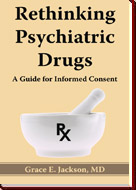Selective
serotonin reuptake inhibitors in childhood depression: systematic review of
published versus unpublished data, by Craig J Whittington, Tim Kendall, Peter Fonagy, David Cottrell, Andrew Cotgrove, Ellen Boddington,
The Lancet (2004):1341-5.
Dr. David Healy's 2/19/2004 letter to the FDA. (5 MB) exhaustively details the research
surrounding the problems with anti-depressants and children, finding that there
have been almost 22,000 deaths caused by SSRIs .
Scientific American Mind,
December 2004 Issue, Treating Depression: Pills or Talk?
February 18, 2004, Dr. Andrew Mosholder
Report on Suicidality in Pediatric Clinical Trials with Paroxetine (Paxil) and
other antidepressant drugs; Follow-up to 9/04/03 Consult. Based on
Dr. Mosholder's review of previously unavailable data showing that the efficacy
of pediatric use of SSRI antidepressants had not been established and they cause
one additional serious suicide related event per 12 patient years of active
treatment, he recommended a risk management strategy discouraging off-label
(unapproved) pediatric use.
-
March 6, 2004, Dr. Avigan Memo.
Although agreeing with Dr. Mosholder's analysis about the lack of efficacy and
the increased risk of suicide-related events, he disagreed with Dr. Mosholder's
recommendation that there should be a label instruction to avoid all unapproved
uses.
-
March 18, 2004, Dr. Trontell Memo,.
Dr. Mosholder's supervisor stated that while he shares Dr. Mosholder's concern
about the potential excess risk of self-injurious behavior, that may in turn,
place children at greater risk of suicidal behaviors, he disagreed this
warranted any treatment recommendations.
-
August 16, Drs. Seligman/Trontell
Follow-Up.
Antidepressants and public
health in Iceland Time series analysis of national data, by Tomas Helgason,
Helgi Tomasson and Tomas Zoega, British Journal of Psychiatry (2004),
104, 157-162.
In this study it was found the huge increase in antidepressant use in Iceland
did nothing to reduce the rate of depression.
Chronic Antidepressant Treatment Alters
Serotonergic Regulation Of Gaba Transmission In Prefrontal Cortical Pyramidal
Neurons, by P. Zhong And Z. Yan, Neuroscience 129 (2004) 65–73
Transcript of February 2, 2004, FDA meeting on
SSRIs (Selective Serotonin Re-uptake Inhibitor antidepressants) and children
suicides contains many first hand accounts of children committing suicide on
SSRIs.
Background Comments for February
2, 2004 Meeting of Psychopharmacological Drugs Advisory Committee (PDAC) and
Pediatric Subcommittee of the Anti-Infective Drugs Advisory Committee (Peds AC),
by Thomas P. Laughren, M.D., Food and Drug Administration Center for Drug
Evaluation and Research, January 5, 2004.
Lines of Evidence on the Risks of
Suicide with Selective Serotonin Reuptake Inhibitors, by David Healy, M.D.,
Psychotherapy and Psychosomatics, 2003;72-71-79. This study found
that the long-suppressed data in the original clinical trials as well as
epidemiological studies indicated a dose dependent link for both agitation
and suicidality. The study concluded that the data indicate a possible
doubling of the relative risk of both suicides and suicde attempts on SSRIs
compared with the older anti-depressants and non-treatment.
Suicidality, violence and mania caused by selective
serotonin reuptake inhibitors (SSRIs): A review and analysis, by Peter R.
Breggin. International Journal of Risk & Safety in Medicine 16
(2003/2004) 31–49. This paper shows that evidence from many sources
confirms that selective serotonin reuptake inhibitors (SSRIs) commonly cause or
exacerbate a wide range of abnormal mental and behavioral conditions. These
adverse drug reactions include the following overlapping clinical phenomena: a
stimulant profile that ranges from mild agitation to manic psychoses, agitated
depression, obsessive preoccupations that are alien or uncharacteristic of the
individual, and akathisia. Each of these reactions can worsen the individual’s
mental condition and can result in suicidality, violence, and other forms of
extreme abnormal behavior. Evidence for these reactions is found in clinical
reports, controlled clinical trials, and epidemiological studies in children and
adults. Recognition of these adverse drug reactions and withdrawal from the
offending drugs can prevent misdiagnosis and the worsening of potentially severe
iatrogenic disorders. These findings also have forensic application in criminal,
malpractice, and product liability cases.
Serotonin syndrome: a brief review, Philippe
Birmes, Dominique Coppin, Laurent Schmitt and Dominique Lauque, Canadian
Medical Association Journal,--Journal de l'Association Médicale
Canadienne, May 27, 2003, 168:11, talks about the symptoms and treatment of
this anti-depressant caused problem: Major mental symptoms: confusion, elevated
mood, coma or semicoma, Minor symptoms: agitation and nervousness, insomnia;
Major Autonomic symptoms: fever, hyperhidrosis, Minor symptoms: tachycardia,
tachypnea and dyspnea, diarrhea, low or high blood pressure; Major Neurological
symptoms: myoclonus, tremors, chills, rigidity, hyperreflexia Minor symptoms:
impaired co-ordination, mydriasis, akathisia
Drug Safety Research, Special Report:
Antidepressant Drugs and Suicidal/Aggressive Behaviors This drug
safety report documents higher than expected numbers of suicidal and aggressive
behaviors observed in some clinical trials of antidepressants in children also
can be seen in spontaneous adverse event data, and add substantial additional
evidence to the case. The data show that suicidal/aggressive behaviors are
reported in both adults and children, but more than twice as often in children.
Finally, while two drugs now carry warnings about this risk, similar risks were
reported for the four drugs without warnings. Findings from these adverse event
data should be interpreted in context with other scientific evidence, and with
consideration of the limitations outlined below.
SSRI Antidepressant Withdrawal Syndrome in Newborns. by by Elizabeth Rudy, D.V.M.,
R.Ph., Drug Therapy Topics, 2002, Vol. 31 No. 2 - Feb. 2002
Canadian Medical Journal Article about Glaxo
witholding detrimental data about Paxil and kids. This Canadian
Medical Journal article discusses the suppression of data about the harm caused
by SSRI's, including an internal document advised staff at the international
drug giant GlaxoSmithKline (GSK) to withhold clinical trial findings in 1998
that indicated the antidepressant paroxetine (Paxil in North America and Seroxat
in the UK) had no beneficial effect in treating adolescents.
The Emperor's New Drugs:
An Analysis of Antidepressant Medication Data Submitted to the U.S. Food and
Drug Administration, by Irving Kirsch, University of Connecticut, Thomas J.
Moore, The George Washington University School of Public Health and Health
Services, Alan Scoboria and Sarah S. Nicholls, University of Connecticut,
Prevention & Treatment, Volume 5, Article 23, posted July 15, 2002.
The Antidepressant Debate, by
Joanna Moncrieff, British Journal of Psychiatry, 2002; 180, 193-4.
Why Has the Antidepressant Era Not
Shown a Significant Drop in Suicide Rates? by H.M. van Praag, Crisis2002
Volume 23(2):77-82.
The
Emperor's New Drugs: An Analysis of Antidepressant Medication Data Submitted to
the U.S. Food and Drug Administration, Prevention & Treatment, Volume
5, Article 23, posted July 15, 2002. This is a series of articles on the
subject in Prevention and Treatment, a peer reviewed journal of the American
Psychological Association.
Fatal toxicity of serotoninergic and
other antidepressant drugs: analysis of United Kingdom mortality data, by
Nicholas A Buckley, Peter R McManus BMJ Vol. 325 7 Dec. 2002; 1332-3.
Treatment of depression related to recurrence:
10-year follow-up in general practice, by E M. van Weel-Baumgarten MD's , W.
J. van den Bosch PhD, Y. A. Hekster PhDt, H. J. van den Hoogen and F. G. Zitman
PhD, Journal of Clinical Pharmacy and Therapeutics (2000) 25, 61-66.
This study found that people who did not take anti-depressants had at least as
good results in terms of depression recurrence as those who did.
Raising Questions about Antidepressants, by David O.
Antonuccio William G. Dantona Garland Y. DeNelskyb, Roger P. Greenbergc James
S. Gordond, Psychother Psychosom 1999;68:3–14. This paper explores
relevant research data and raises questions about these beliefs and that many of
the common beliefs about these medications are not adequately supported by
scientific data: (1) industry-funded research studies which result in negative
findings sometimes do not get published; (2) placebo washout procedures may bias
results in some studies; (3) there are serious questions about the integrity of
the double-blind procedure; (4) the ‘true’ antidepressant drug effect in adults
appears to be relatively small; (5) there is minimal evidence of antidepressant
efficacy in children; (6) side effects are fairly common even with the newer
antidepressants; (7) combining medications raises the risk for more serious
complications; (8) all antidepressants can cause withdrawal symptoms; (9)
genetic influences on unipolar depression appear to be weaker than environmental
influences; (10) biochemical theories of depression are as yet unproven; (11)
biological markers specific for depression have been elusive; (12) dosage and
plasma levels of antidepressants have been minimally related to treatment
outcome; (13) preliminary evidence suggests that patients who improve with
cognitive-behavioral psychotherapy show similar biological changes as those who
respond to medication, and (14) the evidence suggests that psychological
interventions are at least as effective as pharmacotherapy in treating
depression, even if severe, especially when patient-rated measures are used and
long-term follow-up is considered.
Reply to the American College of
Neuropharmacology's Report on SSRI and Suicidal Behavior in Children, by
Jonathan Leo, Ph.D.
Last modified 6/4/2025
Copyright © 2003-2025 Law Project for Psychiatric Rights. All Rights Reserved



